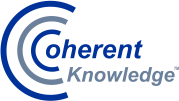Coherent Knowledge will be presenting a 90 minute tutorial on Practical Knowledge Representation and Reasoning in Ergo on Wednesday, July 6, 2016, as part of the 10th International Web Rule Symposium – RuleML being held at Stony Brook University, New York July 6 – 9, 2016. This talk largely focuses on features for advanced debugging of knowledge as well as other new features recently completed or in development. See abstract below. The example Ergo files used in the tutorial, are available on the Presentations and Publications page (Research subsection) .
Hope you can join us there!
Coherent Knowledge is a proud sponsor of RuleML 2016
Practical Knowledge Representation and Reasoning in Ergo
Michael Kifer, Theresa Swift, and Benjamin Grosof (Coherent Knowledge)
Conference Tutorial at the 10th International Web Rule Symposium (RuleML-2016)
Abstract: This talk covers the latest progress in Ergo, a cutting-edge practical knowledge representation and reasoning (KRR) system. Ergo is the most complete and highly optimized implementation of Rulelog, an expressive yet scalable extension of Datalog and logic programs. Ergo’s human-machine logic (humagic) closely relates controlled natural language (NL) with logical syntax/semantics. In case studies, Ergo enables cost-effective, agile development of knowledge bases for automated decisions/analytics support in finance, defense, e-commerce, health, and in domains that utilize complex knowledge such as terminology mappings, policies, regulations, contracts, and science. Ergo features general higher-order formulas, flexible defeasibility via argumentation theories, dynamically evolving knowledge, restraint bounded rationality, object-orientation, probabilistic uncertainty, text interpretation and generation, connectors to external KRR components, such as graph databases, machine learning, and general programming capabilities (including Java). Other important features include full explanations of inferences and run-time debugging/monitoring. At the end of the tutorial we also briefly discuss key frontiers for research, including probabilistic, ML, NL, and multi-processor inferencing.
This tutorial requires no prerequisite knowledge of Ergo nor Rulelog, although familiarity with logic rules, semantic technology, or logic programming is desirable.

